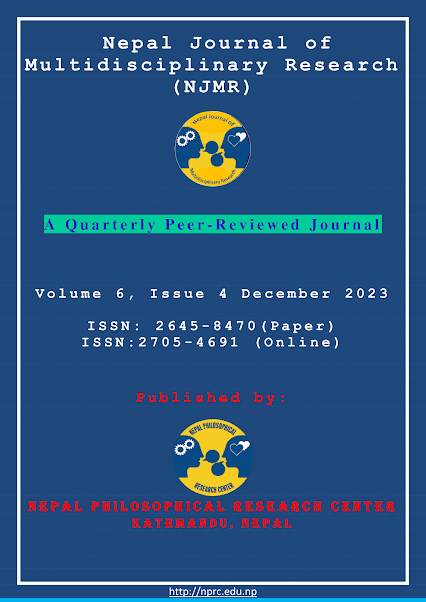Aug 13, 2024
Nepal Journal of Multidisciplinary Research (NJMR)
Feb 19, 2024
Nepal Philosophical Research Center (NPRC)
Nepal Philosophical Research Center (NPRC)
The Nepal Philosophical Research Center (NPRC) could be envisioned as an academic institution dedicated to the study, research, and promotion of philosophy within the context of Nepal's cultural, historical, and intellectual landscape. Here's what such a center might entail:
Research Initiatives: The NPRC would likely conduct and facilitate research projects focusing on various philosophical traditions, including but not limited to Hindu, Buddhist, and other indigenous philosophies prevalent in Nepal. This research could span a wide range of topics, from metaphysics and epistemology to ethics, social philosophy, and political thought.
Publication Endeavors: The NPRC might publish academic journals, books, and other scholarly works aimed at disseminating research findings, theoretical insights, and critical analyses within the field of philosophy. These publications could serve as valuable resources for scholars, students, and enthusiasts interested in Nepalese philosophy.
Educational Programs: The center could offer educational programs, such as workshops, seminars, and conferences, to promote philosophical inquiry and discourse among academics, students, and the wider community. These events could feature presentations, discussions, and debates on philosophical topics of relevance to Nepal and beyond.
Cultural Preservation: Given Nepal's rich cultural heritage and deep philosophical traditions, the NPRC might also engage in activities aimed at preserving and promoting indigenous knowledge systems, philosophical texts, and cultural practices. This could involve archival work, digitization efforts, and collaborative initiatives with local communities and institutions.
Collaborative Partnerships: The NPRC could establish partnerships and collaborations with national and international universities, research institutes, and philosophical organizations to foster interdisciplinary dialogue, exchange of ideas, and joint research endeavors. These partnerships could enhance the center's academic standing and facilitate cross-cultural engagement.
Outreach and Advocacy: In addition to academic pursuits, the NPRC might engage in public outreach and advocacy efforts to raise awareness about the importance of philosophy in addressing contemporary societal challenges, fostering critical thinking skills, and promoting cultural understanding and tolerance.
Overall, the Nepal Philosophical Research Center (NPRC) could serve as a vital hub for philosophical inquiry, scholarship, and cultural enrichment, contributing to the intellectual vibrancy and socio-cultural development of Nepal and beyond.
Nepal Journal of Multidisciplinary Research (NJMR)
Nepal Journal of Multidisciplinary Research (NJMR)
The Nepal Journal of Multidisciplinary Research (NJMR) is a peer-reviewed academic journal that aims to provide a platform for scholars, researchers, and professionals from various disciplines to publish their original research findings, theoretical articles, case studies, and critical reviews. NJMR covers a wide range of fields, including but not limited to:
Social Sciences: This may include sociology, anthropology, psychology, economics, political science, and geography.
Humanities: This encompasses disciplines such as history, philosophy, literature, linguistics, and cultural studies.
Natural Sciences: Fields like physics, chemistry, biology, environmental science, and earth science may be covered.
Applied Sciences: This could involve engineering, technology, computer science, and other applied fields.
Health Sciences: Research related to medicine, public health, nursing, pharmacy, and allied health professions may be included.
Management and Business Studies: This covers areas such as management, marketing, finance, accounting, entrepreneurship, and organizational behavior.
NJMR typically welcomes submissions that contribute significantly to the advancement of knowledge within these disciplines. The journal follows a rigorous peer-review process, wherein submitted manuscripts are evaluated by experts in the relevant field to ensure academic quality and integrity. Accepted articles are then published in the journal's periodic issues, making them accessible to a wider audience of scholars, practitioners, policymakers, and students.
The objectives of NJMR include promoting interdisciplinary research, fostering scholarly exchange and collaboration, and providing a platform for researchers to disseminate their work both nationally and internationally. By publishing diverse and high-quality research articles, NJMR contributes to the enhancement of academic discourse, the generation of new knowledge, and the overall development of multidisciplinary research in Nepal and beyond.
It's worth noting that while this description provides a general overview of the Nepal Journal of Multidisciplinary Research, specific details about the journal's editorial policies, submission guidelines, and publication frequency may vary and should be consulted directly from the journal's website or official documentation for the most accurate and up-to-date information.
Lamjung
Lamjung
Only Daughter
Only Daughter
Sandra Cisneros
"Only Daughter" is an autobiographical
essay. It is also called a narrative essay. It is written by Sandra Cisneros.
In this story, she reflects on her experiences growing up as the only daughter
in a Mexican-American family of six brothers. The essay explores the cultural
expectations placed upon Cisneros as a young girl and how her identity as the
only daughter influenced her relationship with her family and her pursuit of
education and writing. Cisneros discusses the challenges she faced in asserting
her individuality and pursuing her dreams in a culture that often prioritised
the roles and expectations of women within the family. Despite the pressures to
conform to traditional gender roles, Cisneros remained determined to pursue her
education and become a writer, ultimately finding her voice and identity through
her writing. Throughout the essay, Cisneros highlights the importance of
family, culture, and the power of storytelling in shaping one's identity and
sense of self. "Only Daughter" serves as a poignant exploration of
gender, culture, and the complexities of identity in the context of family and
society.
.png)




